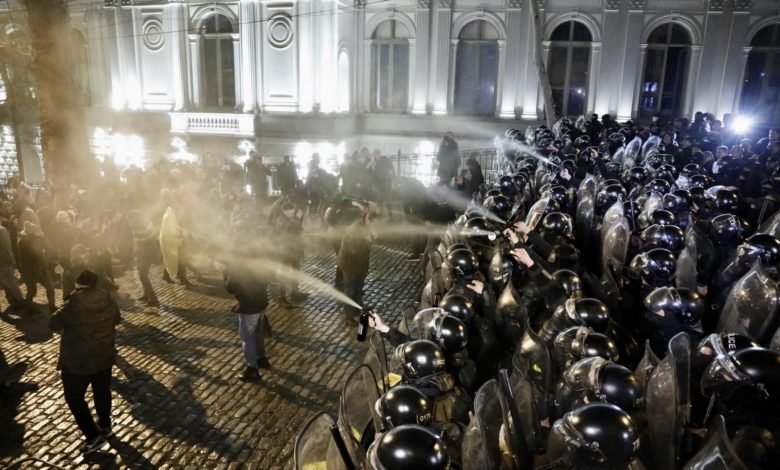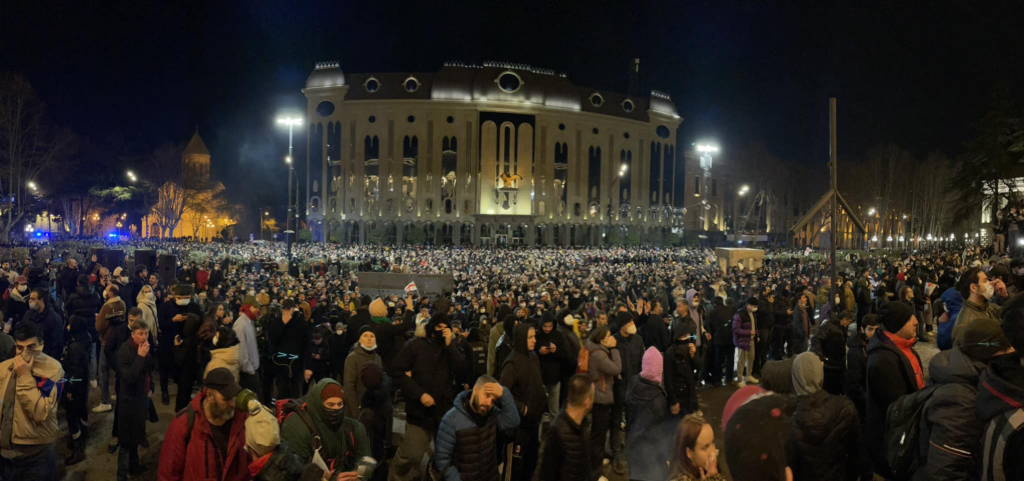
Tbilisi Lives the Night of Protest, Violence
Already tense discussions about the imminent passing of the draft law “On Transparency of Foreign Funding,” also known as the “foreign agent law,” have descended into scenes of violence as the ruling majority decided to ram the controversial changes through the parliament on March 7.
The tensions were high from March 6, when the joint session of the key Legal Affairs Committee of the Parliament endorsed the two draft laws, paving the way for the passing of the law at the plenary. Amid the public and international outcry, The draft was also emphatically rejected by President Salome Zurabishvili.
In a late-night briefing on March 6, MP Mamuka Mdinaradze, the majority faction leader, announced that the draft laws would be heard at the plenary session on Thursday, March 9. The meeting of the parliamentary bureau, which deals with scheduling, was meant to take the final decision during its morning session on March 7.
Morning protest
In anticipation of the bureau discussion, citizens – mostly civic and some party activists – started to gather at the citizens’ (back) entrance of the Parliament to make their voices heard by the MPs.

Like during the previous days’ rallies, the slogan “No To Russian Law” has dominated, together with many other handmade banners and slogans. The EU flags were omnipresent.

MPs and media inside the parliament building reported a heavy presence of additional security personnel, who were blocking the stairways and preventing MPs from circulating freely, especially on the floor where the Bureau session was taking place.
In the meantime, Prime Minister Irakli Garibashvili, on a visit to Berlin, where he attended the tourist fair, signaled the hardening tone of the ruling majority in the parliament was officially shared by the executive. Relegating the argument about the “transparency of CSOs” to the background, PM Garibashvili said, “the future of our country does not belong and will no longer belong to foreign agents or servants of foreign countries.” He also called the opposition “degenerate” and berated the members of the European Parliament and EU officials as “corrupt,” calling them to stop interfering in the country’s affairs. The general tenor of PM’s statement was not only in support of the draft law but in complete alignment with the sovereignist rhetoric of the People’s Power – a group of the majority faction that initiated the law.
Parliament discusses the bill
By around 16:00 Tbilisi time (13:00 CET), the Parliament session was ongoing, with the ruling party securing support from some opposition MPs to elect the new Public Defender. The protesting crowd at the parliament started to thin, expecting a full day of protest during the plenary debate on Thursday.
At that moment, Speaker Shalva Papuashvili announced the draft Defense Code, slated for discussion, was “not ready for presentation” and that the draft “On Transparency of Foreign Funding” will be debated instead. Seeing that the ruling party broke its word and was trying to ram the law through, the opposition leaders and civic activists started to call their supporters to come back to the streets.

Despite the protests from opposition MPs and the calls to honor their commitment to discussing the draft on Thursday, Speaker Papuashvili put the bill to the vote in its first reading. It was adopted with 76 votes to 13, and two more GD MPs said later that their voting machines malfunctioned and asked to add their votes in support.
Outraged by the ruling majority ramming the draft through the Parliament, the number of protesters started to swell into thousands. They have moved from behind the parliament to the front, on Rustaveli avenue. Political party leaders started to appear, but the protest at large did not appear to have a unified overall leadership. Many citizens came spontaneously; activists have organized with their own smaller groups, often online and through social media.

Crackdown
As the session of the Parliament was drawing to a close around 20:00 TBS time, eyewitnesses saw several buses, which usually transport the riot police, enter the Parliament courtyard. The police in riot gear soon appeared on the two side streets of the Parliament. The side streets are usually used for the MP vehicles to leave the building.
The demonstrators seen on live footage and by Civil.ge eyewitnesses were overwhelmingly peaceful. However, the police reported some scuffles, and an attempt to block the side exit of the Parliament triggered the use of force.

the ordinary police cordon on the side street. The exit appears free. Photo: Guram Muradov/Civil.ge
The riot police in full gear deployed through the ordinary police cordon and, after making the audio-recorded warnings for protesters to disperse, started massively using pepper spray.

The riot police then advanced, backed by a water cannon, dispersing the protesters from the side streets and pushing them toward Rustaveli avenue.

As the water cannon and riot police descended the street, people gradually cleared. Irakli Kobakhidze held a briefing around 23:00 TBS time and responded to the U.S. Embassy’s earlier criticism saying it “was only a dark day for the radical opposition and forces related to it.” Both Kobakhidze and the police, which issued another statement around the same time, said the protesters were violent and “throwing objects.” Live TV footage from the same time shows some objects, plastic bottles, sticks, firecrackers, etc., thrown at the advancing line of riot police. The police fired tear gas canisters to complement the pepper spray and water cannon.
There was a short lull around 23:15 TBS after the initial police action, which lasted for about two hours. The riot police seemed to have pulled back, and some went inside the courtyard of the Parliament after the MPs from the majority faction mostly left the building. There were reports that some opposition MPs were blocked inside the building by the Parliament security service.
Past midnight, the locus of the confrontation with the police has shifted to the facade of the Parliament, where a group of youths took down and dismantled the metal protection barriers erected by the riot police on the stairs leading up to the Parliament building as they retreated. The police retorted with pepper spray, mixed into the water cannon stream, and fired gas canisters.
Around the same time, the cameras captured several petrol bombs that appeared to be thrown between the two ranks of the shielded riot police. The fires were promptly extinguished by water cannon.

Around one o’clock past midnight local time, the riot police advanced on protesters on Rustavi avenue and used tear gas, which was deployed on at least two occasions, massively through shot canisters, enveloping the whole avenue. Emergency brigades treated dozens of protesters who suffered the results. Around 1:40 the avenue was largely cleared.

Even as most demonstrators left the central avenue, some remained gathered in a park across the Parliament building. The riot police formed up for the final mop-up operations, arresting several youths. Once the tear gas cloud dissipated, people kept returning to the area, and police made additional arrests at that time.
Altogether 66 people were arrested during a protest rally against the draft law. Among those detained were politicians, including the leaders and party members of “Girchi-More Freedom”, Zura Japaridze and Nika Mosiashvili, as well as Giorgi Mumladze, a member of the “United National Movement”.
By and large, the police operation was over between 3 and 4 am.
